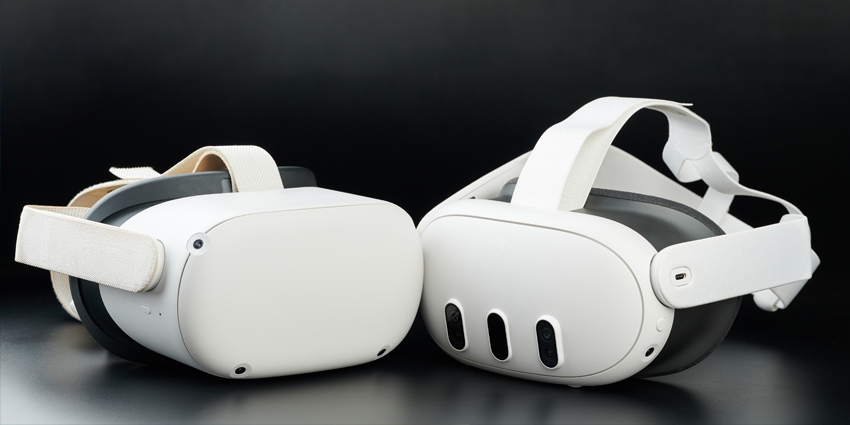Meta Connect is around the corner. Mark Zuckerberg‘s firm is building hype, with audiences expecting big announcements during the September 28th showcase that proves alluring to mainstream audiences year after year.
In a recent Q&A, Meta CTO Andrew Bosworth took to his Instagram account to address the upcoming Quest event and other industry news.
Shedding light on Meta Connect 2024, Bosworth said:
I’m incredibly biased, so make your own call. I think we got the usual exciting stuff in terms of launches, some incredible technology demos of what’s to come. I said this before, but I’ll say again but we really do want this to be a developer conference. A great developer conference where hopefully devs go and they hear that we understand the problems that they have, that we care about, those problems that we’re investing in, solutions to those problems that are going to make their lives easier.
Speaking on Meta Connect, Bosworth confirmed that an AR product would be present during the showcase.
Speaking incredibly favourably, he added:
Groundbreaking. I think the AR announcement will be very groundbreaking. We’ve already kind of teased it,when people start to be able to experience it, I think that’s going to really turn some heads. The big announcements are a big deal, and [they] will have a huge impact on the trajectory of VR and MR in the next couple of years. But I don’t know if that counts as ground-breaking.
Spark AR Closure
Meta has announced that it will discontinue Spark, its AR SDK, which currently allows developers to create basic AR content for Meta’s smartphone social media platforms. While this move will not remove AR integrations on platforms like Messenger, Instagram, and Facebook, it does mean that only first-party Meta AR content will be available on its applications.
The discontinuation of Meta Spark is believed to be a move to exert more control over the distribution of AR content across Meta applications. This could lead to a more sophisticated and closely managed AR distribution method, mainly as Mark Zuckerberg’s firm focuses significantly on AR smart glasses.
Meta’s official statement referred to the discontinuation as a “difficult decision.” The firm will officially shut down the service on January 14, 2024, meaning third-party AR Spark content will no longer be accessible.
However, Meta’s first-party content, which it creates and owns, will remain available. The transition to exclusive first-party AR support also entails closing related services, including Spark Studio, Spark Player, and Spark Hub.
Speaking on the controversial shutdown, Bosworth added:
Spark was a special platform, and it’s such a tremendously important part of how people were introduced to an early form of augmented reality in lenses and effects – obviously, there’s a rich kind of paradigm around that. When we spent a lot of time investing in, we really thought there was a chance that this could be the key developer platform that we needed; when you make the transition to mixed reality and augmented reality, and it ended up not being that for mostly technical reasons.
Bosworth continued, remarking that he is “super sympathetic to the fact that for people in the Spark Community, there’s not much I can say that’s going to make them feel better.”
Bosworth also explained:
I mean, people who invested time and energy and passion into the platform and made it what it was and; built sometimes a business around it or following around it, used it as a creative outlet. I don’t think my answer is going to be very satisfying. A lot of it was just technical.
The CTO also added that Meta developed the Spark AR platform for the mobile phone, however for upcoming AR smart glasses, Bosworth noted that “much richer models” are required.
He stated:
We looked at what it would take to build great experiences in MR/AR, we realized that Spark was the wrong technical foundation for that type of work. So we gotta move to what we think is the right one to enable [that].
Thoughts on PICO Motion Trackers
PICO recently launched its latest mixed-reality headset, the PICO 4 Ultra. This release follows several improvements to the company’s XR product lineup following operational challenges.
Furthermore, PICO also introduced its Motion Tracker solution, a lightweight controller alternative that enables users to interact with a variety of immersive applications using full-body inputs. Weighing just 27g, the motion tracker allows for seamless input, and the company highlights that pairing the device takes only five seconds.
Speaking on PICO’s trackers Bosworth stated the PICO motion trackers “seem cool, and I think it’s fun that they’re doing that. I haven’t had a chance to play with any of the new stuff out of there, but it’s great to see people continuing to push and innovate and try different things.”
However, Bosworth explained that he does not think that many use cases exist “where people need that high of a degree of precision on extremities.”
Meta AI in HMDs
Meta is deeply developing many AI solutions to work alongside its social media and XR device portfolio. Bosworth stated that “we’re going to bring the Meta AI technology everywhere.”
The CTO added that the firm is “obviously” integrated into hardware like the Ray-ban Meta Stories and into the Quest portfolio. Moreover, Bosworth added that Horizon OS will gain AI features and the doremate Horizon Worlds service.
Bosworth added that “over the fullness of time, it [AI] will definitely help with language barriers.”
Thoughts on John Carmack
Earlier in the year, Meta’s Former CTO, John Carmack, expressed his opposition during the development of the Quest Pro device. A device is aimed at the workplace and focuses on leveraging mixed-reality interactions. The Pro headset was released alongside the Quest 3 MR headset, which offers a similar experience at a lower price point.
Carmack also raised concerns about Meta’s decision to allow third-party developers to create applications for its XR products by opening up its Meta Horizon OS. This move is similar to Android’s approach and is intended to compete with Apple’s closed ecosystem. This change will expand the range of applications available for the Quest product portfolio.
Speaking on Carmack’s thoughts, Bosworth added:
John shares opinions pretty freely as it is. I don’t know if I need to do anything special for that. I’d love to have him back on the program at some point. He’s deep in building out Keen AGI, his new company. But he does send notes to me all the time.
Bosworth continued by adding that Carmack and Bosworth were in contact “as recently as a few hours ago” as of the Q&A’s recording. He added that Carmack “sends notes to me, send notes to mark, and we’re always grateful for it.”
Meta Connect will likely aim to wow audiences, following Apple’s stealing moves earlier in the year. If the firm can succeed, it could hinge on how Zuckerberg reacts to the emerging market.







